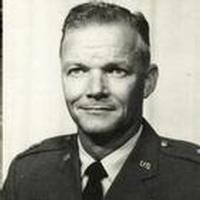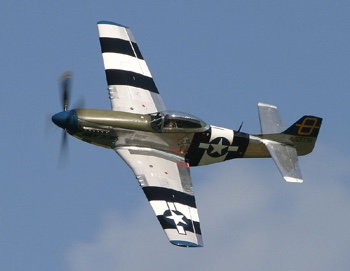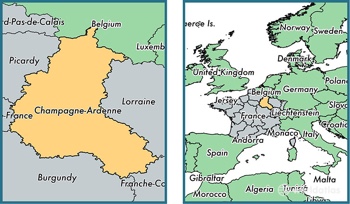Born in Evanston, Illinois, raised in Chicago and Kansas City, Bill Reese was nineteen when he learned to fly in a junior college Civilian Pilot Program. He went from there into the U.S. Army Air Force. He was a fighter pilot, who arrived in England in April 1944, in time to take part in the invasion of Europe. 
His final assignment was as Base Executive Officer at Perrin AFB. He retired in 1969. Lt. Col. Reese died in 2007, but he left behind a memorable account of his time with the French Resistance.
Shot down
by William Reese
17 August 1944 — A strange day to say the least. I took off on this mission a 2nd Lieutenant and was shot down as a 1st Lieutenant. This really was supposed to be a milk run, hitting targets of opportunity inside France. We found a small marshaling yard near a small town with three or four freight cars on a siding, so we set up a pattern and started shooting up the freight cars.
What we didn’t know was that for some reason Jerry (the Germans) had some heavy machine guns set up in the area, and, after my first pass, I got clobbered—smoke coming out of the engine which immediately started to lose power. I zoomed up to about five hundred feet and tried to roll back the canopy, but couldn’t, as it must have been hit and was jammed. I wasn’t very enthusiastic about bailing out anyway, so I looked for a place to belly-in.

The only spot I saw was a little bitty green meadow. Everything else had trees or some other obstructions. About then, the engine gave out completely, so I started a descent and turned toward the field, which, incidentally, seemed to be surrounded by trees.
I could see the field as long as I was in a turn, but once I started in on my final approach, all I could see was smoke and flames. I couldn’t side slip because I was too low—couldn’t even see out the side of the canopy because of the smoke—so I just held a gentle glide until I felt the prop tickling the ground.
The initial touchdown was smooth as glass, then came two sudden, severe jolts and dead silence, with me and the plane covered in a cloud of dust. My green field was mostly dirt. When the dust settled, I decided to try the canopy again. Lo and behold, it cranked back just as it was supposed to.
When I reached down to unfasten my safety belt is when I first realized I had not come through unscathed. My Mae West life preserver and my lap were covered with somebody’s blood—mine! After talking off my helmet and goggles, I felt my face; it felt like my nose covered my face, cheek to cheek. A flap of skin was hanging down over one eye, and I found that I had a fair sized wound on my forehead. As I climbed out of the plane, I noticed that my metal gun-sight mount was broken, so I guess I proved once and for all how hard my head is.
The other three planes in my flight were buzzing around overhead for two reasons—one, to give me a chance to put some distance between me and the plane with no interference from ground troops, and two, to shoot up the plane. It was standard operating procedure to be sure the plane was destroyed as on several occasions, Jerry had repaired fighters and then used them against our bombers. Anyway, I started walking away.
Strangely enough, although I was in somewhat of a daze, I felt no pain at all. I realized I still had my Mae West and parachute on, so I ditched these in some bushes and started on toward a wooded area. My guys were getting low on fuel, and about this time, they had to leave.
As soon as they were gone, two German trucks loaded with soldiers came out from under a bridge where they had been hiding. To give you an idea of my mental state, I just stood there and watched as they drove up to the plane. I guess they didn’t see me, or assumed I was a farmer. Anyway, I finally turned around and walked into the woods.
Into the woods
When I approach the other side, I realized that I was not being very cautious. I heard someone chopping wood, so I crept up to the clearing in front of me and saw a farmer chopping away. I watched him for about thirty minutes and didn’t see anybody else, so I decided to approach him and maybe get some help.
I really needed a drink and some cleaning up. I had a hanky tied around my forehead, and I was wearing in an A-2 jacket, olive drab wool shirt and pants and combat boots, and for the last time in this war, I was unarmed, no gun, no knife.
The farmer spotted me as I stepped out of the woods, but he didn’t run, just kept on chopping. As I got closer, he got a good look at my face and came toward me saying something in French. All I could think to say was, “I’m an American.” He understood the American part, but could not speak one word of English, which made us even so far as communicating.
It’s surprising how fast you improvise with sign language. I got the idea over that I needed something to drink. He shook his head and showed my his empty wine bottle and then brightened up and got me to follow him to a small clump of trees in the middle of the field.
Eureka, a spring! He held the empty wine bottle under the water until it filled, but as I started to grab it, he held me off and held the bottle up to the sky, shook his head, poured the water out and filled it again. This time I wanted to look also. You could see some little wiggly things swimming around in the bottle.
Finally, after four fillings, we couldn’t see anything, and I thought, “What the hell, I’ve had shots of just about everything else,” so I had my first and last drink of water in France. No ill affects either. I then got out my escape and evasion kit, which included a few hundred French francs, silk maps of Europe and a little bitty compass know as the “asshole” compass because that’s where you hid it if captured.
I knew I was in France, but where exactly escaped me. The farmer, amid much gesticulation and rapid-fire French, finally oriented himself with the map and pointed to a name, Epagne. I decided to head northwest and hope for the best. I shook hands with the farmer, left the field and, after going through another wooded area, came upon a paved road that seemed to go more or less in the direction I wanted to go. I followed it for a short distance and came up to a bridge with a small village on the other side. (Note: The village of Épagne is in the Champagne-Ardenne region of France, east of Paris, on the River L’Aube.)

When you are crossing a bridge, you are sure enough exposed with no possibility of jumping off to the side and hiding in the weeds as you could on a road. I carefully studied the scene for about thirty minutes, didn’t see a single soul, and stepped out just in time to meet a mother and daughter who had come up over the little hill behind me.
All three of us were kind of shook up, so they hurried on across the bridge ahead of me. About the time I got across the bridge, here came a little girl on her bicycle. She took one good look at me, turned around and rode like a bat out of hell away from me. I thought at the time that I was really in trouble and she would alert every German in the vicinity. Little did I know that I had just had my first meeting with the Maquis, the French underground. The only thing the Germans feared more than the Maquis were American planes.
I didn’t know it at the time, but the village was the next village up river from Epagne. Those two villages had the only cement and steel bridges crossing the river for one hundred miles. About a mile out of the village, I saw a man coming, riding a bicycle. He didn’t look to threatening, so I stayed on the road.
As he came opposite me, he slowed and said, “American?”
I said, “Oui, I’m American.”
Next week: Part 2: With the French Resistance